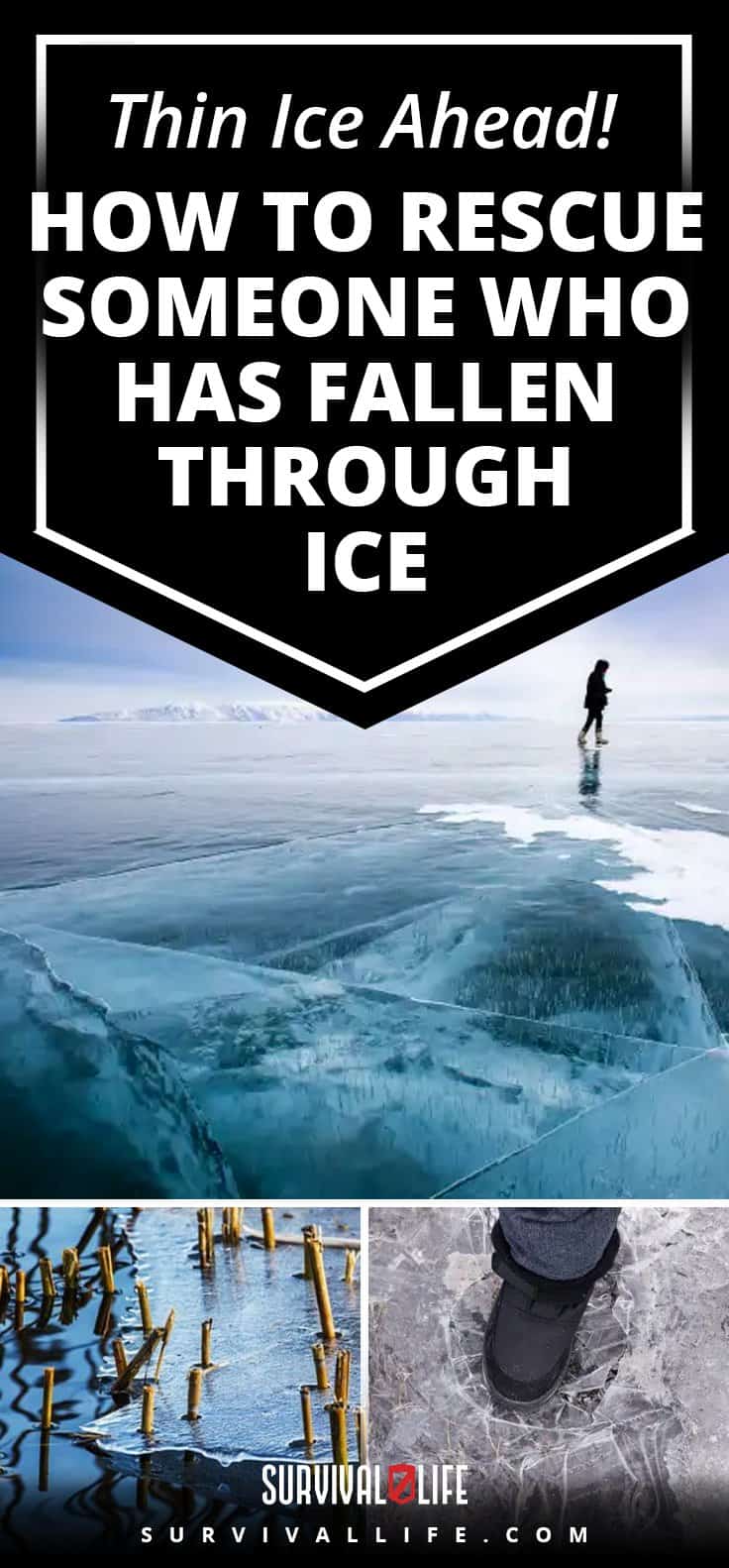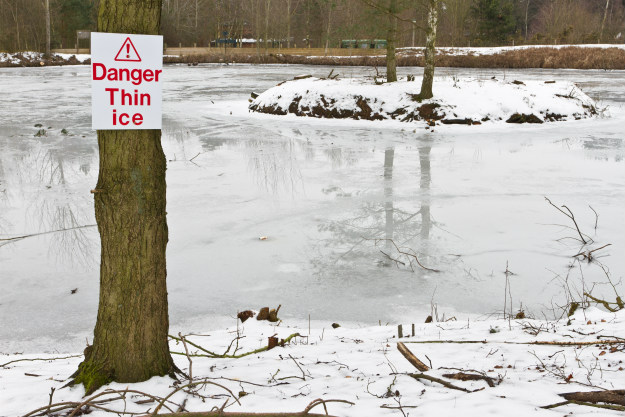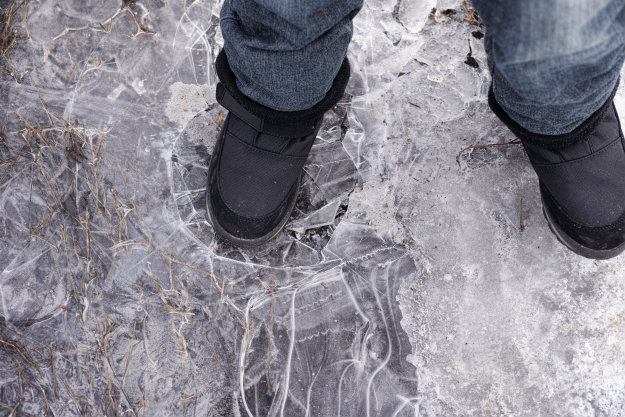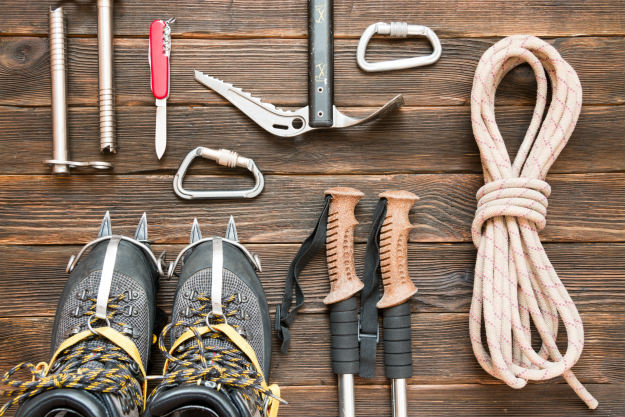Survival Skills
Thin Ice Ahead! How To Rescue Someone Who Has Fallen Through Ice

Winter is upon us, and one of the most immediate dangers is thin ice! Follow these steps to ensure the safety of the person who has fallen through the ice.
How to Save Someone Who Has Fallen Through Thin Ice
For this scenario, you find yourself near a body of icy water and suddenly you hear a cry for help. Someone has fallen through the thin ice! What do you do? Though your first instinct may be to run to the person's rescue, this can actually lead to you also falling into the ice and becoming just as helpless.
Rescuing the Victim
Follow these steps to ensure the safety of the person who has fallen through the thin ice– as well as your own safety.
1. Throw a long object towards the victim. If the victim cannot get out on his own and help has not arrived, you should throw a long object that the victim can hold on to, such as a pole, a rope, a tree limb, or even a long scarf. Connecting yourself with the drowning person with a long object will keep you out of harm’s way. Once the object reaches the victim, he should wrap it around himself as much as he can.
- To increase the chances of a safe ice rescue, you should be prepared with rope and other long items if you plan on going onto the ice.
- Get a rope, extension cord, hockey stick, or any other sort of strong line that you can find.
- Since the victim's cold hands may not be able to grip the line, tie a loop (not a slip knot—preferably a bowline knot) at the end of the rope and tell them to put their arms through the loop and then bend their arms to touch their shoulders so that the rope is inside the bend of their elbows. Alternatively, they can put the loop over their head and slide it down under their arms.
2. Throw the victim a life preserver. If you don't have a rope or a stick, pull the victim out using a sled, a life preserver, or any other object. These rescue items will be more helpful than anything else.
3. Row toward the victim. Follow these steps if you don't have any rescue objects on hand. If you happen to have a lightweight boat that you can push across the ice ahead of you, you should push it to the edge of the hole, get into the boat, and then pull the victim over the bow, making sure that the boat doesn't capsize. Attaching rope to the boat so the boat can easily be brought to the shore by other rescuers isn't a bad idea – if there's some rope nearby.
4. Form a human chain if necessary. If you don't have any rescue devices but you're with multiple people, then you may need to make a human chain to rescue the individual. To do this, you'll need to have the rescuers lie on the ice as closely as they can, forming a chain by holding on to the ankles of the person in front of him. The person at the front of the chain, who is closest to the victim, should grab the victim by his hands and should pull him flat onto the ice while the person at the end of the chain pulls the chain back.
Though the human chain is not ideal, it's far better than having one person trying to help the victim who is in danger of falling in because he has no back-up. If the person in the front of the chain also falls in, he'll have the support of the person holding onto his ankles.
5. Pull the victim out. Stay low, stay off the thin ice, and pull hard. If you have helpers, have them use their strength to assist with pulling while staying away from the thin ice. Whether you're pulling the person as the lead in a human chain or you're pulling him up with the help of a rope, the victim should be dragged across the ice instead of being lifted and carried.
- Remain at a safe distance from the weak ice, and keep a strong grip on the rope or object. If you must approach, always spread your weight as much as possible.
- At a minimum, if you don't have any objects to throw, crawl on your belly––never walk. Another easy way to move with your weight spread out is to lay down with your hands above your head and roll on the ice.
- If you do pull the victim out with a rope or other long object, make sure that you're pulling the victim toward you, and not the other way around.
Keeping The Victim Safe
After you have rescued the victim from the water, follow these next steps to keep him safe.
1. Perform CPR if necessary. If the victim has stopped breathing or has no pulse, either from drowning or from sudden cardiac arrest, perform CPR on the victim only if you know how. Please, do not attempt CPR if you do not know how but, keep yelling for help if help has not yet arrived to maximize your chances of finding someone who knows how to perform CPR. Even if the person appears to be dead, do not give up. Icy water can lower body temperature and slow down body functions. Just because the person isn't moving or responding doesn't mean he isn't alive and in need of help.
If you are interested in learning more about CPR, please read my article, Surviving Hypothermia: What To Do Until Medical Help Arrives. My advice to everyone is to become certified in CPR. Knowing the skill of CPR is one of the most important skills that any survivalist or outdoorsman can learn.
**Disclaimer: The CPR instructions within the article listed above are intended for informational purposes only. Before performing CPR please seek proper certification and training.
2. Warm the victim. If the victim is breathing and conscious, bring him or her inside or somewhere warm. He may need to be treated for shock as soon as possible. Remove wet clothes and immerse the person in lukewarm water that's no warmer than 90° Fahrenheit, 32° Celsius. Gradually warm the water up later. Immersing a victim of hypothermia in water that is too warm can cause dangerous heart rhythms. If warm water is not immediately available, wrap the person in blankets.
Though you may think that giving the person something warm to eat or drink will help him, you should not give any food or drink to a person who is still in shock and unable to eat or drink.
3. Get the victim medical attention as soon as possible. Even if the victim feels fine, he or she should still be examined by a medical professional. Though you have rescued the victim from the ice, you're not out of the woods quite yet. The repercussions of falling through ice, even for a few minutes, can be deadly. The person may be suffering from frostbite or a number of other complications.
Avoid Future Falls
If you want to prevent future falls through the ice, you should always know the thickness of the ice. Research in advance where you'll be fishing, walking, snowboarding, etc. You can check the thickness of the ice by using an ice chisel, ice auger, cordless drill, or tape measure.
Another option is to call the local bait shop or lakeside resort to ask about the ice conditions in the area. Here are the appropriate thicknesses for each activity:
- 2″ (5 cm) or less: Stay off the ice. The ice is too thin and won't support your weight.
- 4″ (10 cm): appropriate for ice fishing or other on-foot activities.
- 5″ (12.5 cm): appropriate for a snowmobile or ATV.
- 8″ – 12″ (20.5 – 30.5 cm): appropriate for a car or a small pickup.
- 12″ – 15″: (20.5 – 38 cm) appropriate for a medium-sized truck.

Want to learn more? Follow us on Facebook and Twitter for the latest survival tips and news!
![]()
In need of some reliable thin ice winter gear? Check out these options!
- Check out this EKTOS 90% Wool Blanket that's perfect for survival & emergency preparedness!
- Prepare in advance and wear the proper socks, like these Merino Wool Men's Hiking Socks,
when going out in winter weather. - Always bring safety essentials when you know you're going to be out on the ice. This Titan Mil-Spec 550 Paracord/Parachute Cord won't let you down in an emergency!
-

 Paracord Projects1 year ago
Paracord Projects1 year agoParacord Projects | 36 Cool Paracord Ideas For Your Paracord Survival Projects
-

 Paracord Projects1 year ago
Paracord Projects1 year agoHow To Make Paracord Survival Bracelets | DIY Survival Prepping
-

 Medical Care1 year ago
Medical Care1 year ago21 Home Remedies For Toothache Pain Relief
-

 Knife Laws1 year ago
Knife Laws1 year agoAre Switchblades Legal? Knife Laws By State
-

 Do It Yourself1 year ago
Do It Yourself1 year agoSurvival DIY: How To Melt Aluminum Cans For Casting










Pingback: Thin Ice Ahead! How To Rescue Someone Who Has Fallen Through Ice
Pingback: How to Prevent Hypothermia | Survival Life
Pingback: How Bolt Cutters Can Help You For Your Emergency
Pingback: How Bolt Cutters Can Help You For Your Emergency
Pingback: How Bolt Cutters Can Help You For Your Emergency - Survive!
Pingback: How Bolt Cutters Can Help You For Your Emergency | survivalisthandbook.com
Pingback: How Bolt Cutters Can Help You For Your Emergency - Survivalist 101
Pingback: Walking On Ice Safety Tips – The Self-Sufficient Life
Pingback: Walking On Ice Safety Tips | Winter Survival Safety Tips - Cooking in Quarantine
Pingback: Walking On Ice Safety Tips | Winter Survival Safety Tips – Sprent Brass
Pingback: Walking On Ice Safety Tips – surviveurself
Pingback: Walking On Ice Safety Tips | Winter Survival Safety Tips – SurvivalHood
Pingback: Walking On Ice Safety Tips – Prepper Nut
Pingback: 5 Ways How Bolt Cutters Can Be Useful During Emergencies – The Self-Sufficient Life
Pingback: Jeff Schock: Captain of the No Longer Floating St. Joseph [PODCAST] - Cooking in Quarantine
Pingback: Jeff Schock: Captain of the No Longer Floating St. Joseph [PODCAST] – Bulletproof Survivors
Pingback: Jeff Schock: Captain of the No Longer Floating St. Joseph [PODCAST] – Sprent Brass